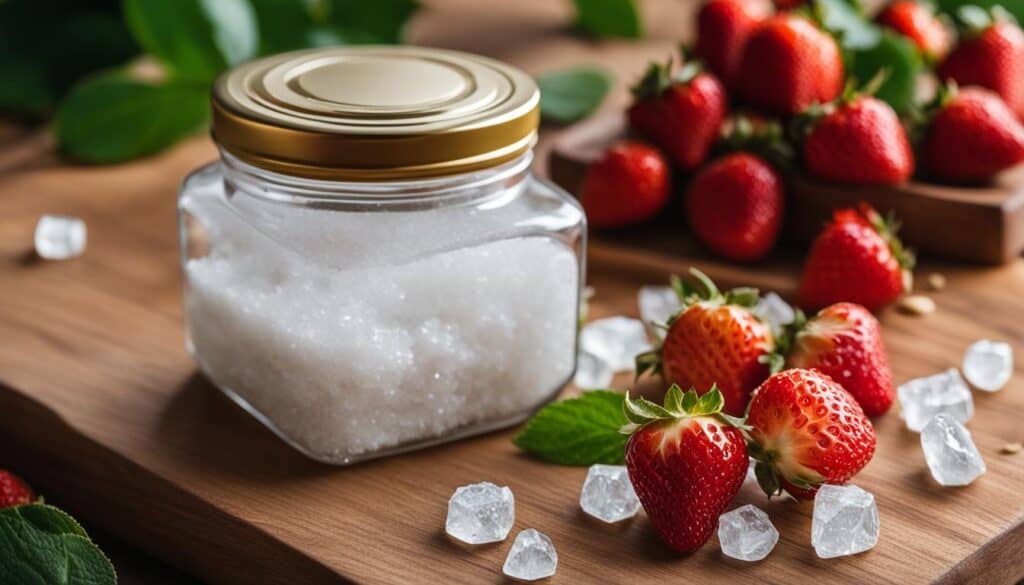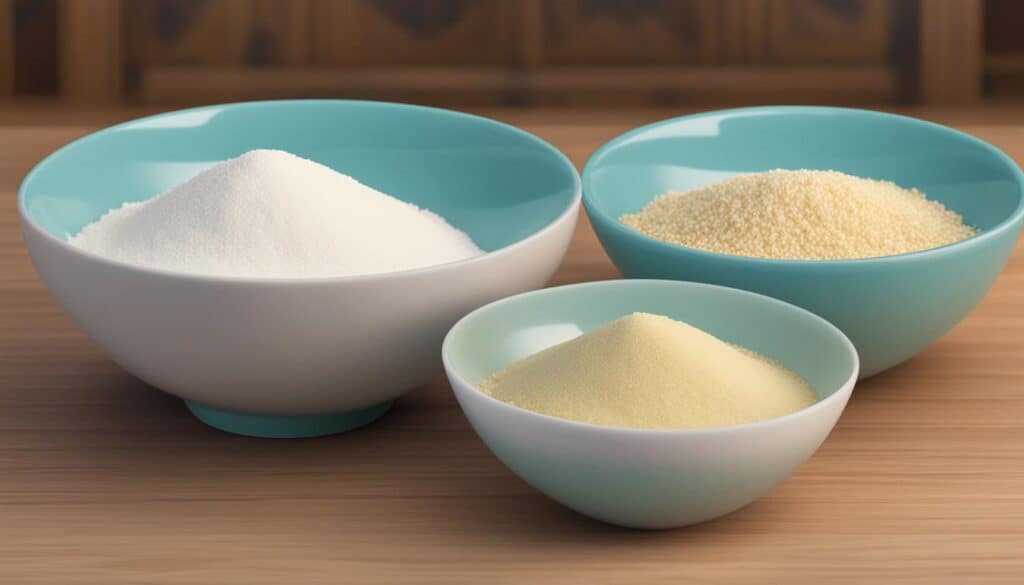Are you looking for healthier alternatives to sugar in your baking? Look no further. In this article, I will compare two popular sweeteners—monk fruit and erythritol—and help you decide which one is best for your baking needs.
Monk fruit and erythritol are both natural sugar substitutes that offer numerous benefits for those looking to reduce their sugar intake. They are low glycemic sweeteners, meaning they have minimal impact on blood sugar levels, making them suitable options for individuals with diabetes or those following a low-carb or keto diet.
Key Takeaways:
- Monk fruit and erythritol are natural sugar substitutes that can be used in baking.
- Monk fruit is a zero-calorie sweetener that does not have an aftertaste.
- Erythritol is a low-calorie sweetener that is well-tolerated by the body.
- Both sweeteners are suitable options for individuals looking to reduce their sugar intake.
- Experimenting with both monk fruit and erythritol can help determine which one works best for your specific baking needs.
Understanding Monk Fruit Sweetener
Monk fruit extract is a relative newcomer to the sugar substitute scene. It is approved by the FDA as a sweetener and is about 200 times sweeter than sugar. Monk fruit sweeteners are naturally derived and contain zero calories. They are often blended with other sugar-free sweeteners, such as erythritol, for easier use in cooking and baking.
Monk fruit is also believed to contain antioxidants, which may provide additional health benefits.
Benefits of Monk Fruit Sweetener in Baking
When it comes to baking, finding a sweetener that not only adds sweetness but also offers additional benefits is a game-changer. Monk fruit sweetener is one such option that brings numerous advantages to your baked goods. Let’s explore the benefits of using monk fruit sweetener in baking:
- Zero-calorie content: Monk fruit sweetener is a fantastic choice for those watching their calorie intake. With zero calories, it allows you to reduce the overall calorie content of your baked goods without compromising on sweetness.
- Natural sugar substitute: If you’re looking for a healthier alternative to refined sugar, monk fruit is a great natural option. Derived from the monk fruit, this sweetener is free from artificial additives and provides a more natural way to sweeten your baked treats.
- No aftertaste: Unlike some sugar substitutes, monk fruit sweeteners do not leave behind any unpleasant aftertaste. This means you can enjoy the sweetness of your baked goods without any lingering artificial flavors.
Whether you’re aiming to reduce calorie intake, follow a low-carb diet, or simply want to make healthier choices in your baking, monk fruit sweetener checks all the boxes. Not only does it provide sweetness without the calories, but it also ensures a pleasant taste experience. So go ahead, experiment with monk fruit sweetener in your favorite recipes, and indulge in guilt-free, delicious baked treats.
Take a look at this visually appealing image showcasing the benefits of monk fruit sweetener in baking:
Now that you’re aware of the benefits of monk fruit sweetener, it’s time to explore its counterpart, erythritol. In the next section, we dive into the benefits of erythritol in baking, providing you with a comprehensive understanding of both sweeteners.
Understanding Erythritol
Erythritol is a natural sugar substitute and a popular low-calorie sweetener. Derived from certain fruits and vegetables, erythritol belongs to the sugar alcohol family, which includes other sweeteners like xylitol and sorbitol. What sets erythritol apart is its unique combination of sweetness and low calorie content.
Unlike traditional sugar, erythritol has a significantly lower calorie count. With only 0.2 calories per gram, it offers a guilt-free alternative for those seeking a healthier option without sacrificing sweetness. This makes it an excellent choice for individuals on a restricted-calorie diet or for anyone looking to reduce their overall sugar intake.
Erythritol is well-tolerated by the body and does not typically cause unpleasant digestive side effects commonly associated with other sugar alcohols. It is absorbed into the bloodstream but is not fully metabolized by the body, resulting in limited effects on blood sugar levels. This makes erythritol a suitable sugar substitute for individuals with diabetes or those monitoring their blood sugar levels.
One of the key advantages of erythritol is its similarity in taste and texture to sugar. It replicates the sweetness of sugar without leaving a lingering aftertaste, making it an appealing option for those who desire a natural sugar substitute that doesn’t compromise on flavor. Whether used in beverages, baked goods, or other recipes, erythritol can seamlessly replace sugar without sacrificing taste.
In the world of baking, erythritol is a reliable choice due to its stability under high temperatures. It does not break down or lose its sweetness, even when exposed to heat during the baking process. This makes it an ideal ingredient for creating a wide range of delicious and low-calorie treats, from cookies and cakes to muffins and bread.
Overall, erythritol offers a compelling alternative to traditional sugar. With its low calorie content, natural origins, and absence of aftertaste, erythritol presents a promising solution for individuals looking to enjoy the sweetness of sugar while maintaining a healthier lifestyle.

Erythritol: Nutritional Information
| Nutrient | Amount per 100g |
|---|---|
| Calories | 20 |
| Total Carbohydrates | 100g |
| Sugar Alcohols | 100g |
| Protein | 0g |
| Fat | 0g |
| Fiber | 0g |
| Sodium | 0mg |
Benefits of Erythritol in Baking
Erythritol offers a range of benefits that make it an excellent sweetener choice for baking. Whether you’re watching your calorie intake, looking for a sugar substitute, or seeking a sweetener without an aftertaste, erythritol has got you covered.
Low Calorie Sweetener
One of the major advantages of using erythritol in baking is its low calorie content. Unlike sugar, which is high in calories, erythritol provides sweetness without the extra calories. This makes it an ideal option for individuals who are conscious of their calorie intake and are looking for ways to cut back on sugar without sacrificing taste.
Sugar Substitute
Are you searching for a natural and healthy alternative to sugar in your baked goods? Look no further than erythritol. As a sugar substitute, erythritol provides sweetness similar to sugar but with fewer calories. It can be used in a 1:1 ratio as a replacement for sugar in recipes, making it a convenient and effective option for reducing sugar intake while maintaining the desired taste and texture in your baked creations.
No Aftertaste
If you’ve ever tried artificial sweeteners and been put off by their aftertaste, you’ll be pleased to know that erythritol does not have that problem. It provides sweetness without leaving any unpleasant aftertaste, making it a popular choice for those who want to enjoy the natural flavor profile of their baked goods without the lingering taste of artificial sweeteners.
Heat-Stable
When it comes to baking, heat stability is crucial. Erythritol holds up well under high temperatures and maintains its sweetness without breaking down. This means you can confidently use erythritol in various baking applications, including cookies, cakes, and bread, without worrying about the sweetener losing its effectiveness during the baking process.
With all these benefits, it’s no wonder that erythritol has become a go-to sweetener for many bakers. Its low calorie content, versatility as a sugar substitute, lack of aftertaste, and heat stability make it a fantastic option for those looking to create delicious and healthier baked goods.
Comparing Monk Fruit and Erythritol in Baking
When it comes to choosing the right sweetener for baking, it’s essential to compare the individual characteristics of monk fruit and erythritol. Each sweetener offers unique benefits and considerations, allowing you to make an informed decision based on your personal preferences and baking goals.
Monk fruit: Monk fruit is known for its intense sweetness and zero-calorie content. It is approximately 200 times sweeter than sugar, making it a potent natural substitute. Furthermore, monk fruit sweeteners do not contribute any calories, making them an excellent choice for those following low-calorie or low-carb diets.
Erythritol: Erythritol, on the other hand, offers a taste and texture that closely resembles sugar. It is a low calorie sweetener, meaning it provides sweetness with fewer calories than traditional sugar. Erythritol is well-tolerated by the body and does not cause the digestive discomfort often associated with other sugar alcohols.
Both monk fruit and erythritol have their advantages in baking, and the choice between the two depends on your specific needs and preferences. If you’re looking for intense sweetness without any calories, monk fruit is an excellent option. On the other hand, if you prefer a taste and texture similar to sugar with reduced calorie content, erythritol may be the right choice for you.
It’s worth mentioning that while monk fruit and erythritol have their own distinct characteristics, they can also be combined to enhance their respective benefits. Blending monk fruit and erythritol sweeteners can provide a balance of sweetness and the desired taste, making it a versatile option for various baking recipes.

Experimenting with both sweeteners in your baking endeavors allows you to discover which one aligns best with your taste preferences and dietary goals. Whether you choose monk fruit, erythritol, or a combination of the two, these natural sweeteners offer a healthier alternative to sugar, allowing you to enjoy your favorite baked treats guilt-free.
Other Healthy Sweeteners for Baking
While monk fruit and erythritol are popular choices for baking, there are other healthy sweeteners available that offer variety in flavors and characteristics. These alternatives can be great options for those looking for natural sugar substitutes and low glycemic sweeteners.
Stevia
Stevia is a natural sugar substitute derived from the stevia plant. It is a zero-calorie sweetener that provides sweetness without the added calories of sugar. Stevia is known for its high sweetness intensity, so a little goes a long way. It is available in both liquid and powder form, making it versatile for baking purposes.
Allulose
Allulose is a low calorie sweetener that is naturally found in certain fruits. It has a similar taste to sugar but contains fewer calories. Allulose is unique as it has a similar texture and mouthfeel to sugar, making it a great substitute in baking recipes. It is also heat-stable, allowing it to withstand high temperatures without losing its sweetness.
Coconut Sugar
Coconut sugar is a minimally processed sweetener made from the sap of coconut palms. It has a caramel-like flavor and can be used as a one-to-one replacement for sugar in baking. While coconut sugar does contain calories, it has a lower glycemic index compared to regular table sugar, making it a suitable option for those looking for a low glycemic sweetener.
Try experimenting with these healthy sweeteners in your baking recipes to discover new flavors and enjoy the benefits of natural sugar substitutes.
Here’s a recap of the healthy sweeteners for baking:
| Sweetener | Description |
|---|---|
| Stevia | A natural zero-calorie sweetener derived from the stevia plant. |
| Allulose | A low calorie sweetener found naturally in certain fruits with a similar taste and texture to sugar. |
| Coconut Sugar | A minimally processed sweetener made from the sap of coconut palms, offering a caramel-like flavor. |

With these alternatives to monk fruit and erythritol, you can expand your baking options and create delicious treats while keeping your recipes healthy and flavorful.
Tips for Baking with Monk Fruit and Erythritol
When it comes to baking with monk fruit and erythritol, there are a few tips that can elevate your baking game. Whether you’re looking to substitute sugar with these natural sweeteners or simply adjust the sweetness level in your recipes, these tips will help you achieve the perfect results.
1. Adjusting Sweetness Level:
Since both monk fruit and erythritol are sweeter than sugar, you’ll need to use less of these sweeteners to achieve the desired level of sweetness. Start by reducing the amount of sweetener in your recipe and gradually adjust it according to your taste preferences.
2. Experiment with Ratios:
Every baker has their own preference for sweetness, so feel free to experiment with different ratios when using monk fruit or erythritol. You might find that a 1:1 substitution works well in some recipes, while a lower ratio is more suitable for others. Don’t be afraid to get creative and find the perfect balance.
3. Consider Textural Changes:
It’s important to note that monk fruit and erythritol may affect the texture and browning of your baked goods differently than sugar. These sweeteners do not caramelize like sugar, so your final product may be lighter in color. Additionally, erythritol has a cooling effect, so keep that in mind when choosing it for certain recipes.
4. Combine Sweeteners:
If you’re hesitant about using monk fruit or erythritol as the sole sweetener in your recipe, consider combining them with other natural sweeteners like stevia or allulose. This can help balance their flavors and achieve a more well-rounded sweetness in your baked goods.
5. Taste and Adjust:
Lastly, always taste your batter or dough before baking to ensure the sweetness is to your liking. Remember that everyone’s taste buds are different, so trust your palate and make any necessary adjustments before it’s too late.
By following these tips, you’ll be able to confidently bake with monk fruit and erythritol, whether you’re substituting sugar or simply looking to explore new sweetening options. Get creative in the kitchen and enjoy the benefits of these natural sweeteners in your favorite recipes.
Potential Side Effects and Considerations
While both monk fruit and erythritol are generally considered safe for consumption, it is important to be aware of potential side effects. When using these sweeteners in baking, it’s crucial to consider certain factors to ensure a positive baking experience.
Potential Side Effects of Monk Fruit and Erythritol
Monk fruit:
- Monk fruit is typically well-tolerated and does not have any known side effects.
Erythritol:
- Consuming large quantities of erythritol may lead to gastrointestinal discomfort, such as bloating or diarrhea.
Considerations When Using Monk Fruit and Erythritol in Baking
Reading labels and choosing pure sweeteners:
When using monk fruit or erythritol in baking, it’s essential to read product labels carefully. Look for sweeteners that are pure and free from additives or fillers. This ensures that you are using high-quality sweeteners in your recipes.
Moderation:
Like any food ingredient, moderation is key when using sweeteners in baking. While monk fruit and erythritol can be great alternatives to sugar, it’s important to use them in appropriate amounts to maintain a balanced diet.
Taste adjustments:
Since monk fruit and erythritol are sweeter than sugar, you may need to adjust the sweetness level in your baking recipes. Experiment with different ratios to find the desired level of sweetness for your individual taste preferences.
Texture and browning:
It’s important to note that monk fruit and erythritol may affect the texture and browning of your baked goods differently than sugar. Be prepared for potential differences in the final outcome of your recipes and make adjustments as necessary.
Personal tolerance:
Everyone’s tolerance to sweeteners may vary. Pay attention to how your body reacts to monk fruit and erythritol, especially if you have any underlying health conditions or sensitivities.
To ensure a positive baking experience with monk fruit and erythritol, consider these potential side effects and key considerations. By incorporating these sweeteners mindfully, you can enjoy the benefits they offer while creating delicious and health-conscious baked goods.
Conclusion
After comparing monk fruit and erythritol as sweeteners in baking, it is clear that both options offer enticing benefits for those looking to reduce their sugar intake while still enjoying delicious treats. Monk fruit is a naturally derived sweetener with no calories, making it an excellent choice for individuals on low-calorie or low-carb diets. On the other hand, erythritol provides a similar taste and texture to sugar, but with fewer calories. This versatile sweetener is well-tolerated by the body and can be used as a substitute for sugar in various baking recipes.
When deciding which sweetener to use, personal preference, dietary needs, and desired outcomes in baking should be taken into consideration. Experimenting with monk fruit and erythritol can help you find the best option for your baking creations. These sweeteners not only provide sweetness without the extra calories of sugar but also offer healthier alternatives for those seeking a more balanced approach to baking.
While monk fruit and erythritol are great choices, it’s worth mentioning that there are other healthy sweeteners available as well. Stevia, allulose, and coconut sugar are excellent alternatives for those looking to explore different flavors and characteristics in their baking recipes. Ultimately, the best sweetener for baking will vary depending on individual preferences and dietary goals. So go ahead, get creative, and enjoy the journey of discovering the perfect sweetener for your next batch of homemade treats!
FAQ
What is monk fruit sweetener?
Monk fruit sweetener is derived from the monk fruit, a small gourd native to Southeast Asia. It is a zero-calorie sweetener that is about 200 times sweeter than sugar. Monk fruit sweeteners are often blended with other sugar-free sweeteners for easier use in cooking and baking.
What are the benefits of using monk fruit sweetener in baking?
Monk fruit sweetener is a great option for baking because it is a zero-calorie sweetener. It can help reduce the overall calorie content of baked goods while still providing sweetness. Additionally, monk fruit sweeteners do not have an aftertaste, making them a popular choice for those who want to avoid the taste of artificial sweeteners.
What is erythritol?
Erythritol is a sugar alcohol that occurs naturally in many fruits and vegetables. It is a low-calorie sweetener commonly used as a sugar substitute. Erythritol has a similar taste to sugar but contains fewer calories. It is also well-tolerated by the body and does not cause gastrointestinal discomfort like some other sugar alcohols.
What are the benefits of using erythritol in baking?
Erythritol provides sweetness without the extra calories of sugar, making it a suitable option for those watching their calorie intake. It does not have an aftertaste, which makes it a preferred choice for those who want to avoid the taste of artificial sweeteners. Erythritol is also heat-stable, meaning it can withstand high temperatures without breaking down or losing its sweetness.
How do monk fruit and erythritol compare as sweeteners for baking?
Monk fruit is sweeter than erythritol and has no calories, while erythritol provides a similar taste to sugar and is a low-calorie sweetener. The choice between these two sweeteners ultimately depends on personal preference, dietary needs, and desired outcome in baking.
Are there other healthy sweeteners for baking?
Yes, there are other healthy sweeteners for baking, such as stevia, allulose, and coconut sugar. Stevia is a natural sugar substitute derived from the stevia plant, allulose is a low-calorie sweetener found naturally in certain fruits, and coconut sugar is a minimally processed sweetener made from the sap of coconut palms.
What should I keep in mind when baking with monk fruit or erythritol?
When baking with these sweeteners, it may be necessary to adjust the sweetness level in recipes since both monk fruit and erythritol are sweeter than sugar. It is also recommended to experiment with different ratios to find the desired level of sweetness. Additionally, these sweeteners may affect the texture and browning of baked goods differently than sugar.
Are there any potential side effects or considerations when using monk fruit and erythritol in baking?
Some people may experience gastrointestinal discomfort when consuming erythritol in large quantities, while monk fruit is typically well-tolerated without any known side effects. It is important to read labels and choose sweeteners that are pure and free from additives or fillers. As with any food ingredient, moderation is key when using sweeteners in baking.
Which sweetener is the best for baking?
The choice between monk fruit and erythritol (or other sweeteners) depends on personal preference, dietary needs, and desired outcomes in baking. Experimenting with different sweeteners can help you find the best option for your baking recipes.
What are some healthy baking options?
Some healthy baking options include using natural sugar substitutes like monk fruit, erythritol, stevia, allulose, or coconut sugar. These alternatives provide sweetness without the extra calories of sugar and can be used in various baking recipes.





Leave a Reply